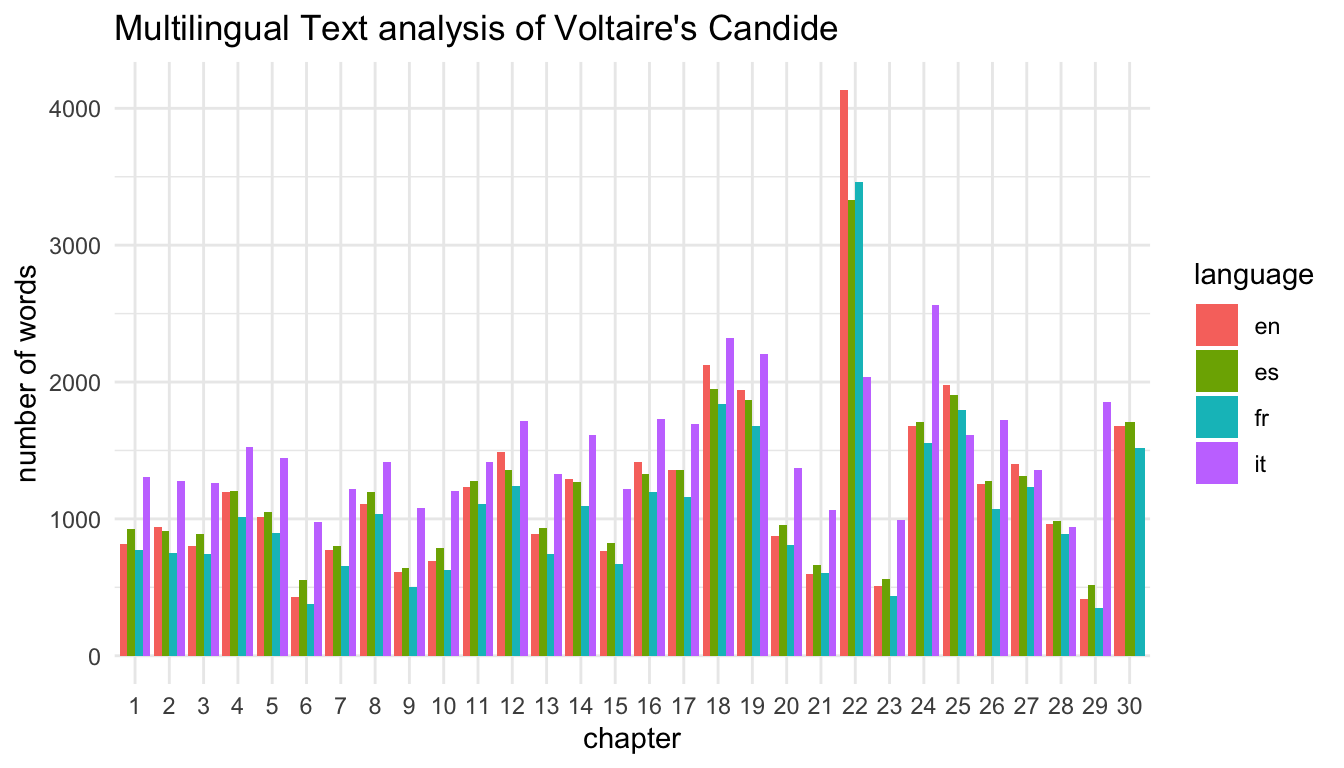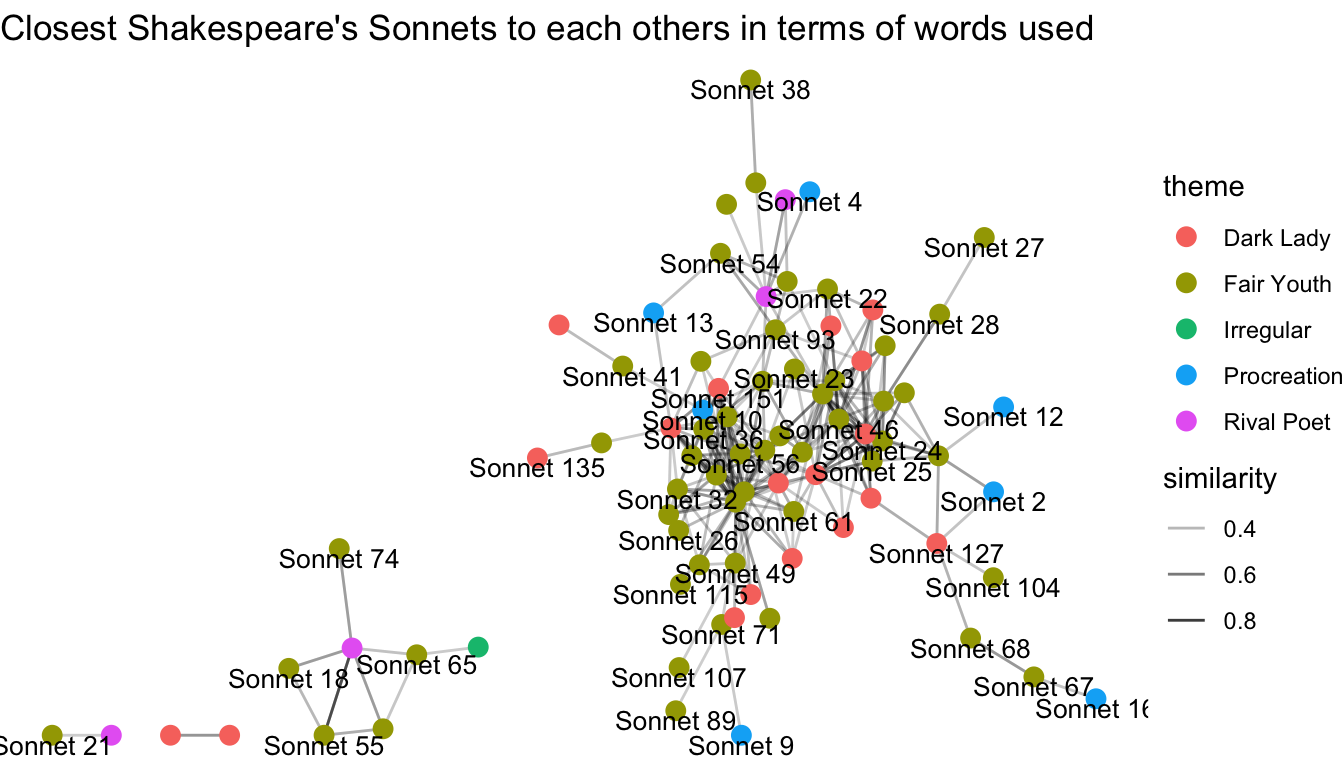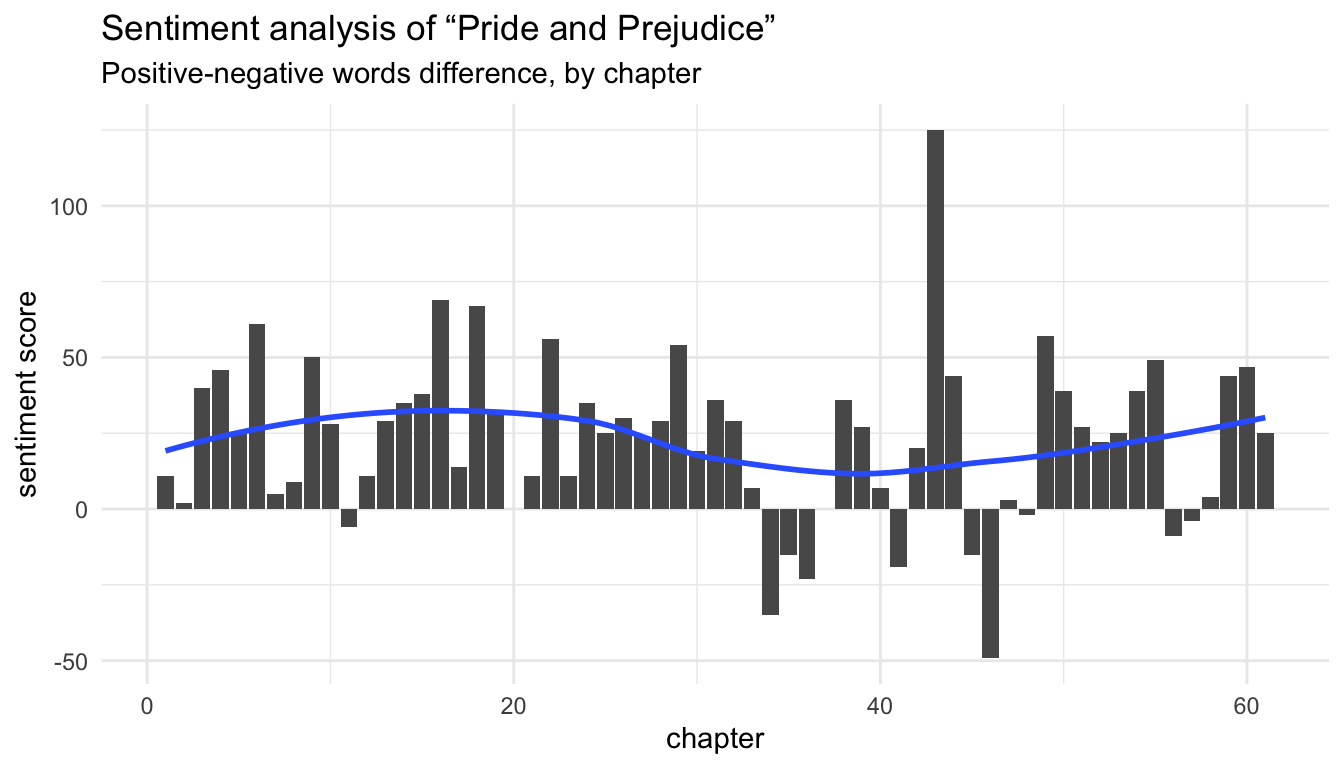The digital library Wikisource, a sister projet of Wikipedia, hosts books in the public domain in almost all languages. More than 100’000 books are accessible in English, Spanish, French, German, Russian or Chinese.
The wikisourcer R package helps you download any book or page from Wikisource. The text is downloaded in a tidy dataframe, so it can be analyzed within the tidyverse ecosystem as explained for example in the book Text mining with R.
Download books
To download Voltaire’s philosophical novel Candide, simply paste the url of the table of content into the wikisource_book function. Note that the book is already classified by chapter with the page variable.
library(wikisourcer) wikisource_book(url = "https://en.wikisource.org/wiki/Candide")
## # A tibble: 864 x 5
## text page language url title
## <chr> <int> <chr> <chr> <chr>
## 1 "" 1 en https://en.wikisource… Cand…
## 2 "In the country of Westphalia, i… 1 en https://en.wikisource… Cand…
## 3 "The Baron was one of the most p… 1 en https://en.wikisource… Cand…
## 4 "My Lady Baroness, who weighed t… 1 en https://en.wikisource… Cand…
## 5 "Master Pangloss taught the meta… 1 en https://en.wikisource… Cand…
## 6 "\"It is demonstrable,\" said he… 1 en https://en.wikisource… Cand…
## 7 "Candide listened attentively an… 1 en https://en.wikisource… Cand…
## 8 "One day when Miss Cunegund went… 1 en https://en.wikisource… Cand…
## 9 "On her way back she happened to… 1 en https://en.wikisource… Cand…
## 10 "" 1 en https://en.wikisource… Cand…
## # … with 854 more rowsMultiple books can easily be downoaded using the purrr package. For example, we can download Candide in French, English, Spanish and Italian.
library(purrr) fr <- "https://fr.wikisource.org/wiki/Candide,_ou_l%E2%80%99Optimisme/Garnier_1877" en <- "https://en.wikisource.org/wiki/Candide" es <- "https://es.wikisource.org/wiki/C%C3%A1ndido,_o_el_optimismo" it <- "https://it.wikisource.org/wiki/Candido" urls <- c(fr, en, es, it) candide <- purrr::map_df(urls, wikisource_book)
Before making a text analysis, the text should be cleaned from remaining Wikisource metadata.
library(stringr) library(dplyr) candide_cleaned <- candide %>% filter(!str_detect(text, "CHAPITRE|↑")) %>% #clean French filter(!str_detect(text, "CAPITULO")) %>% #clean Spanish filter(!str_detect(text, "../|IncludiIntestazione|Romanzi|^\\d+")) #clean Italian
We can now compare the number of words in each chapter by language.
library(tidytext) library(ggplot2) candide_cleaned %>% tidytext::unnest_tokens(word, text) %>% count(page, language, sort = TRUE) %>% ggplot(aes(x = as.factor(page), y = n, fill = language)) + geom_col(position = "dodge") + theme_minimal() + labs(x = "chapter", y = "number of words", title = "Multilingual Text analysis of Voltaire's Candide")

Download pages
The wikisource_book function sometimes doesn’t work. It happens when the main url path differs from the ones of the linked urls or when the function fails to identify correctly the linked urls. This issue can easily be fixed using the wikisource_page function.
The wikisource_page function has two arguments, i.e. the Wikisource url and an optional title for the page. For example, we can download Sonnet 18 of William Shakespeare.
wikisource_page("https://en.wikisource.org/wiki/Shakespeare's_Sonnets_(1883)/Sonnet_18", page = "Sonnet 18") %>% dplyr::filter(!(text %in% c(""," "))) #remove blank rows
## # A tibble: 14 x 4
## text page language url
## <chr> <chr> <chr> <chr>
## 1 Sonne… en https://en.wikisource.org/w…
## 2 XVIII. Sonne… en https://en.wikisource.org/w…
## 3 Shall I compare thee to a summe… Sonne… en https://en.wikisource.org/w…
## 4 Thou art more lovely and more t… Sonne… en https://en.wikisource.org/w…
## 5 Rough winds do shake the darlin… Sonne… en https://en.wikisource.org/w…
## 6 And summer's lease hath all too… Sonne… en https://en.wikisource.org/w…
## 7 Sometime too hot the eye of hea… Sonne… en https://en.wikisource.org/w…
## 8 And often is his gold complexio… Sonne… en https://en.wikisource.org/w…
## 9 And every fair from fair someti… Sonne… en https://en.wikisource.org/w…
## 10 By chance or nature's changing … Sonne… en https://en.wikisource.org/w…
## 11 But thy eternal summer shall no… Sonne… en https://en.wikisource.org/w…
## 12 Nor lose possession of that fai… Sonne… en https://en.wikisource.org/w…
## 13 Nor shall Death brag thou wande… Sonne… en https://en.wikisource.org/w…
## 14 When in eternal lines to time t… Sonne… en https://en.wikisource.org/w…The wikisource_book function fails to download the 154 Sonnets from the main url “https://en.wikisource.org/wiki/Shakespeare's_Sonnets”. We have to use wikisource_page to download them.
Let’s begin by creating a list of the 154 wikipages we want to download, using the R base function paste0.
urls <- paste0("https://en.wikisource.org/wiki/Shakespeare's_Sonnets_(1883)/Sonnet_", 1:154)
Now we can download all the Sonnets with purrr.
## # A tibble: 4,751 x 4
## text page language url
## <chr> <chr> <chr> <chr>
## 1 "" Sonnet… en https://en.wikisource.org/wiki/Shak…
## 2 "" Sonnet… en https://en.wikisource.org/wiki/Shak…
## 3 "" Sonnet… en https://en.wikisource.org/wiki/Shak…
## 4 "" Sonnet… en https://en.wikisource.org/wiki/Shak…
## 5 "" Sonnet… en https://en.wikisource.org/wiki/Shak…
## 6 "HEAD OF EROS (CUPID),… Sonnet… en https://en.wikisource.org/wiki/Shak…
## 7 "" Sonnet… en https://en.wikisource.org/wiki/Shak…
## 8 "SONNETS. " Sonnet… en https://en.wikisource.org/wiki/Shak…
## 9 "I." Sonnet… en https://en.wikisource.org/wiki/Shak…
## 10 "" Sonnet… en https://en.wikisource.org/wiki/Shak…
## # … with 4,741 more rowsWe can make a text similarity analysis. Which sonnets are the closest to each others in terms of words used?
library(widyr) library(SnowballC) library(igraph) library(ggraph) sonnets_similarity <- sonnets %>% filter(!str_detect(text, "public domain|Public domain")) %>% #clean text tidytext::unnest_tokens(word, text) %>% anti_join(tidytext::get_stopwords("en")) %>% anti_join(data_frame(word = c("thy", "thou", "thee"))) %>% #old English stopwords mutate(wordStem = SnowballC::wordStem(word)) %>% #Stemming count(page, wordStem) %>% widyr::pairwise_similarity(page, wordStem, n) %>% filter(similarity > 0.25) # themes by sonnet theme <- data_frame(page = unique(sonnets$page), theme = c(rep("Procreation", times = 17), rep("Fair Youth", times = 60), rep("Rival Poet", times = 9), rep("Fair Youth", times = 12), rep("Irregular", times = 1), rep("Fair Youth", times = 26), rep("Irregular", times = 1), rep("Dark Lady", times = 28))) %>% filter(page %in% sonnets_similarity$item1 | page %in% sonnets_similarity$item2) set.seed(1234) sonnets_similarity %>% graph_from_data_frame(vertices = theme) %>% ggraph() + geom_edge_link(aes(edge_alpha = similarity)) + geom_node_point(aes(color = theme), size = 3) + geom_node_text(aes(label = name), size = 3.5, check_overlap = TRUE, vjust = 1) + theme_void() + labs(title = "Closest Shakespeare's Sonnets to each others in terms of words used")

Tidy text analysis
The wikisourcer package has been built to work within the tidyverse ecosystem. For example, we can easily make a tidy sentiment analysis of any book by chapter, as the chapters are automatically created in the page variable.
library(tidyr) jane <- wikisource_book("https://en.wikisource.org/wiki/Pride_and_Prejudice") jane_sent <- jane %>% unnest_tokens(word, text) %>% inner_join(get_sentiments("bing")) %>% anti_join(get_stopwords("en")) %>% count(page, sentiment) %>% spread(key = sentiment, value = n) %>% mutate(sentiment = positive - negative) ggplot(jane_sent, aes(page, sentiment)) + geom_col() + geom_smooth(method = "loess", se = FALSE) + theme_minimal() + labs(title = "Sentiment analysis of “Pride and Prejudice”", subtitle = "Positive-negative words difference, by chapter", x = "chapter", y = "sentiment score")

More example of text analysis can be found in the book Text mining with R.